
Wiley Interdisciplinary Reviews-Cognitive Science
Scope & Guideline
Synthesizing knowledge to shape the future of cognition.
Introduction
Aims and Scopes
- Interdisciplinary Integration:
The journal focuses on integrating perspectives from psychology, neuroscience, linguistics, philosophy, and artificial intelligence, promoting a holistic understanding of cognitive processes. - Cognitive Development and Learning:
Research on cognitive development, including language acquisition, motor behavior, and social cognition, is a core area, exploring how cognitive abilities evolve across the lifespan. - Neuroscientific Approaches:
The use of advanced neuroscientific methods, such as fMRI and transcranial magnetic stimulation, to investigate cognitive functions and disorders is a significant focus area. - Philosophical Perspectives:
The journal frequently addresses philosophical implications of cognitive science, particularly in relation to developments in AI and deep learning, examining their impact on our understanding of cognition. - Memory and Self-Awareness:
Exploration of autobiographical memory and self-awareness, including their neurological bases and implications for mental health, is a recurring theme. - Perception and Attention:
Research on perceptual processes and attention allocation, including biases and their implications for learning and decision-making, is prominently featured.
Trending and Emerging
- Application of AI in Cognitive Science:
There is a notable increase in discussions surrounding the implications of artificial intelligence and deep learning for cognitive science, indicating a growing intersection between technology and cognitive research. - Social Cognition and Interaction:
Research on social cognition, including co-perception and the social aspects of cognitive development, is gaining traction, reflecting a broader interest in the social dimensions of cognition. - Neuroscience of Emotion and Mental Disorders:
Recent publications emphasize the cognitive neuroscience of emotional disorders, showcasing a trend towards understanding the neural underpinnings of mental health issues. - Cross-Modal Perception and Learning:
Investigations into cross-modal perception and its effects on learning processes are emerging as a significant area of interest, highlighting the complexity of sensory integration in cognition. - Embodiment in Cognition:
The concept of embodiment, exploring how physicality impacts cognitive processes, is increasingly featured, reflecting a shift towards understanding cognition as situated and context-dependent.
Declining or Waning
- Implicit Attitudes Research:
Despite its past relevance, research on implicit attitudes and their measurement is appearing less frequently, indicating a potential shift towards more explicit cognitive measures and methodologies. - Animal Models in Cognitive Research:
The use of animal models for understanding cognitive processes, while still relevant, seems to be receiving less attention compared to human-centered studies, reflecting an increasing focus on human cognition. - Traditional Cognitive Tasks:
There appears to be a decline in the exploration of traditional cognitive tasks (e.g., memory tasks) in favor of more complex, real-world cognitive applications and interdisciplinary approaches. - Sociolinguistic Perspectives on Cognition:
Studies specifically focusing on sociolinguistic aspects of cognition are becoming less frequent, possibly overshadowed by more direct investigations of cognitive mechanisms. - Cognitive Aging Studies:
Research specifically targeting cognitive aging and its implications has seen a reduction, possibly due to a broader focus on cognition across the lifespan rather than solely on aging.
Similar Journals
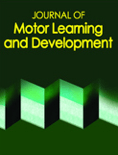
Journal of Motor Learning and Development
Unraveling the science behind movement and skill acquisition.Journal of Motor Learning and Development, published by HUMAN KINETICS PUBL INC, is a dynamic peer-reviewed journal dedicated to advancing the field of motor learning and development. Since its inception in 2017, the journal has become an important resource for researchers, professionals, and students, focusing on the intricacies of motor skills acquisition and its implications across various domains, including biophysics, cognitive neuroscience, experimental and cognitive psychology, as well as orthopedics and sports medicine. With notable rankings in the 2023 Scopus categories, the journal's impact is evidenced by its contributions to understanding human movement and development within sport and rehabilitation contexts. Although it does not currently offer open access, the journal remains a critical platform for sharing innovative research findings and fostering dialogue among scholars dedicated to this vital area of study. Researchers are encouraged to contribute their work, as the journal aims to provide a comprehensive stage for the latest experimental insights and theoretical advancements in motor learning.
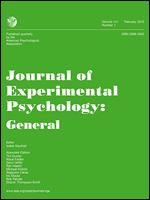
JOURNAL OF EXPERIMENTAL PSYCHOLOGY-GENERAL
Exploring the Depths of Cognitive UnderstandingJOURNAL OF EXPERIMENTAL PSYCHOLOGY-GENERAL, published by the American Psychological Association, is a leading journal in the field of experimental and cognitive psychology. With an ISSN of 0096-3445 and a robust impact factor that reflects its significant contribution to research, this journal serves as a premier outlet for empirical studies that advance our understanding of psychological processes across development and cognition. Covering a wide array of topics from developmental neuroscience to general psychology, it is categorized in the Q1 quartile across multiple fields, making it a vital resource for researchers, professionals, and students alike. The journal has maintained a consistent publication record since its inception in 1975, continuously freeing insights that shape the future of psychology and related disciplines. With rigorous peer review and high standards of scholarly excellence, JOURNAL OF EXPERIMENTAL PSYCHOLOGY-GENERAL remains an essential platform for disseminating innovative psychological research.
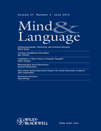
MIND & LANGUAGE
Bridging Disciplines to Illuminate Language and ThoughtMIND & LANGUAGE, published by WILEY, is a premier academic journal that has established itself as a leading platform for interdisciplinary research at the intersection of linguistics, philosophy, and cognitive science. With a noteworthy impact factor and a remarkable ranking in the top quartiles (Q1) for both Linguistics and Language as well as Philosophy, it reflects the journal’s robust contribution to the academic community, garnering attention from researchers and scholars worldwide. Since its inception in 1986, MIND & LANGUAGE has provided an avenue for exploring the complexities of language perception, cognitive processes, and the philosophical implications of linguistic studies. Its comprehensive scope ensures that it remains a critical resource for professionals and students alike who are engaged in the exploration of language's role in human thought and society. The journal's rigorous peer-review process guarantees the high quality and scholarly integrity of the published work, making it an essential addition to any academic library.
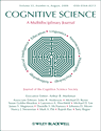
COGNITIVE SCIENCE
Connecting Minds: Where Science Meets InsightCOGNITIVE SCIENCE, published by WILEY, is a leading academic journal that delves into the complexities of human cognition through an interdisciplinary lens. With an ISSN of 0364-0213 and an E-ISSN of 1551-6709, this journal has made significant strides in the field since its inception in 1977, ample coverage through to 2024, and a commendable Q1 and Q2 categorization in Experimental and Cognitive Psychology and Cognitive Neuroscience as of 2023. The journal is positioned at the intersection of various disciplines, ranking #65 out of 165 in Experimental and Cognitive Psychology and #58 out of 115 in Cognitive Neuroscience, highlighting its relevance and contribution to advancing knowledge in these areas. Although it does not offer open access, COGNITIVE SCIENCE remains an essential resource for researchers, professionals, and students seeking to explore groundbreaking research and theoretical insights within the vast domain of cognitive science.
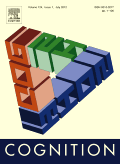
Cognition
Unraveling the Mysteries of the MindCognition, published by Elsevier, is a leading journal dedicated to the exploration and advancement of knowledge in the multifaceted fields of cognitive neuroscience, cognitive psychology, and linguistics. Since its inception in 1972, this prestigious journal has established itself as a prominent platform for disseminating innovative research and critical reviews, achieving a remarkable Q1 ranking across various relevant categories, including Cognitive Neuroscience and Developmental Psychology, as per the 2023 metrics. With a focus on providing insights that are vital for researchers, professionals, and students alike, Cognition boasts an impressive standing in the academic community, evidenced by its high Scopus rankings which place it in the top percentiles in several disciplines. Researchers interested in the cognitive processes underlying human thought, language, and behavior will find Cognition an invaluable resource that publishes cutting-edge findings and fosters interdisciplinary collaboration. Though it operates under a traditional access model, the breadth and depth of its content ensure it remains integral to advancing cognitive science.

PSYCHONOMIC BULLETIN & REVIEW
Advancing Psychological Insight, One Review at a Time.PSYCHONOMIC BULLETIN & REVIEW is a premier journal published by SPRINGER, dedicated to advancing the fields of psychology, particularly within the domains of Arts and Humanities, Developmental and Educational Psychology, and Experimental and Cognitive Psychology. With its ISSN 1069-9384 and E-ISSN 1531-5320, the journal serves as a vital resource for researchers, professionals, and students striving to stay at the forefront of psychological science. The journal boasts an impressive impact factor and ranks in the top quartile (Q1) in relevant categories, reflecting its prestigious standing in the academic community. Covering research from 1994 to 2024, it offers rich interdisciplinary insights into psychological processes and theoretical developments, supporting researchers in disseminating their findings effectively. While not an open-access journal, it provides various access options to ensure that vital research remains within reach of its audience. With a commitment to fostering scholarly dialogue and innovation, PSYCHONOMIC BULLETIN & REVIEW plays an indispensable role in shaping contemporary psychological discourse.

Journal of Cognitive Enhancement
Exploring Innovative Pathways in Neuroscience.Journal of Cognitive Enhancement, published by SpringerNature, is a premier academic platform dedicated to advancing knowledge in the fields of Cognitive Neuroscience, Behavioral Neuroscience, and Experimental Psychology. With an electric combination of rigorous research and innovative practice, this journal has established itself as an essential resource for researchers, professionals, and students interested in understanding the mechanisms behind cognitive enhancement and its implications for mental health and cognitive function. As of 2023, it is recognized in the Q2 and Q3 quartiles across several categories, demonstrating its solid impact in the academic community, particularly with an impressive Scopus ranking of #27/76 in Neuropsychology and Physiological Psychology. Operating in a competitive landscape, the Journal of Cognitive Enhancement fosters open dialogue and collaboration through valuable contributions to cognitive research, facilitating insights that are crucial for practical applications in clinical and educational settings. While specific open access options are currently not defined, we encourage all interested scholars to explore the rich database of published works dating from 2017 to 2024, contributing to this dynamic field of study.
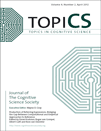
Topics in Cognitive Science
Illuminating the Pathways of Human-Technology InteractionTopics in Cognitive Science, published by WILEY, is a premier interdisciplinary journal that advances the understanding of the cognitive processes that underpin human behavior and interaction with technology. With a commendable impact factor and a strong focus on research from 2009 to 2024, this journal garners significant attention in various subfields, as evidenced by its Q1 ranking in Experimental and Cognitive Psychology and Linguistics and Language, alongside a Q2 position in Artificial Intelligence, Cognitive Neuroscience, and Human-Computer Interaction. Researchers and professionals will find invaluable insights into the latest experimental findings, theoretical discussions, and practical applications that bridge cognitive neuroscience, psychology, and computer science. Topics in Cognitive Science is especially pivotal for those aiming to delve deeper into cognitive mechanisms and their implications within our increasingly digital world, making it an essential resource for students and scholars alike.
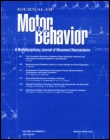
JOURNAL OF MOTOR BEHAVIOR
Exploring the Dynamics of Human MovementJOURNAL OF MOTOR BEHAVIOR, published by Routledge Journals, Taylor & Francis Ltd, is a leading platform that explores critical insights into the dynamics of motor functions and behavior across various disciplines including biophysics, cognitive neuroscience, and sports science. With an ISSN of 0022-2895 and an E-ISSN of 1940-1027, this journal has been a vital resource since its inception in 1969, offering a comprehensive analysis of motor control, skill acquisition, and the neural mechanisms underlying motor performance. Positioned in the Q3 quartile across multiple categories for 2023, it ranks competitively within its fields, such as #136 in Orthopedics & Sports Medicine and #95 in Experimental & Cognitive Psychology. JOURNAL OF MOTOR BEHAVIOR serves not only as an essential reference for researchers and professionals but also as an invaluable resource for students pursuing studies in motor behavior and related areas, reflecting the ongoing evolution and significance of this field in enhancing our understanding of human movement and performance.

PSYCHOLOGIA
Advancing Psychological Insights Since 1996PSYCHOLOGIA is a distinguished academic journal published by the Psychologia Editorial Office, focusing on the broad field of psychology. Originating from Japan, the journal serves as a platform for innovative research and insights into various psychological phenomena, contributing significantly to the advancement of psychological knowledge since its establishment in 1996. With an ISSN of 0033-2852 and an E-ISSN of 1347-5916, PSYCHOLOGIA primarily targets researchers, professionals, and students who are passionate about the intricacies of human behavior and cognition. Currently categorized in the Q4 quartile of psychology (miscellaneous) based on 2023 metrics, it holds a Scopus rank of #157 out of 216, indicating its developing presence within the academic community. Despite being published without open access options, the journal remains committed to fostering scholarly dialogue and disseminating significant findings that shape contemporary psychological research. As it converges towards its issue set for 2024, PSYCHOLOGIA continues to be an essential resource for those seeking to deepen their understanding of psychological sciences.